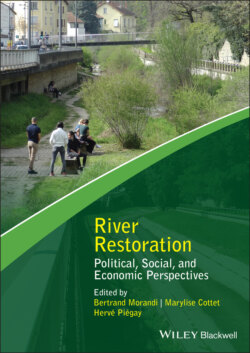Читать книгу River Restoration - Группа авторов - Страница 9
Оглавление
Series Foreword
The field of river restoration and management has evolved enormously in recent decades, driven largely by increased recognition of the ecological values, river functions, and ecosystem services. Many conventional river management techniques, emphasizing hard structural controls, have proven difficult to maintain over time, resulting in sometimes spectacular failures, and often degraded river environments. More sustainable results are likely from a holistic framework, which requires viewing the “problem” at a larger catchment scale and involves the application of tools from diverse fields. Success often hinges on understanding the sometimes complex interactions among physical, ecological, and social processes.
Thus, effective river restoration and management requires nurturing the interdisciplinary conversation, testing and refining our scientific theories, reducing uncertainties, designing future scenarios for evaluating the best options, and better understanding the divide between nature and culture that conditions human actions. It also implies that scientists better communicate with managers and practitioners, so that new insights from research can guide management and results from implemented projects can, in turn, inform research directions.
The series provides a forum for “integrative sciences” to improve rivers. It highlights innovative approaches, from the underlying science, concepts, methodologies, new technologies, and new practices, to help managers and scientists alike improve our understanding of river processes, and to inform our efforts to better steward and restore our fluvial resources for more harmonious coexistence of humans with their fluvial environment.
G. Mathias Kondolf, University of California, Berkeley, USA
Hervé Piégay, University of Lyon, CNRS, France
